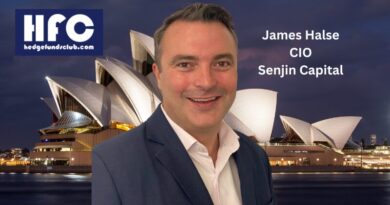Noviscient’s Scott Treloar on the rumoured death of risk management
The Archegos family office fiasco, Greensill Capital’s collapse and several other recent incidents have revealed what seems to be some serious risk management issues in the wider finance industry. Hedge Funds Club boss Stefan Nilsson checked in with Scott Treloar to get some views on what’s going on. Scott is the Founder and CIO of Noviscient in Singapore. He has lectured on portfolio risk management at Henley Business School and was Chief Risk Officer at Vulpes Investment Management. He co-founded the hedge fund Novalis Capital and his career has also included stints at Deutsche Bank, Committed Capital and Macquarie Bank.
What has happened to how counterparty risk is viewed recently? The Archegos fiasco caught out many blue-chip brokers resulting in billions of dollars in losses. Is it greed that makes some professionals, who should know better, accept too much risk?
I don’t think it is greed. Many people in finance are greedy, and greed is an essential requirement of capitalism. Instead, I would suggest the fundamental problem is, as for almost all financial disasters, the poor structuring of incentives. In the case of Credit Suisse, they earned fees from the Archegos relationship the prior year of $17.5 million and made losses of $5.4 billion. So, that seems badly structured. More interesting is the game-theoretic aspect of the situation. The Archegos family office was running leveraged and opaque total return swaps with multiple prime brokers, where the brokers were not aware of each other’s positions. This meant they were working off imperfect information and were vulnerable to competitive actions in the event of adverse market movements. However, suppose a broker has better information by being headquartered in the time zone where the trading happens. And suppose it has asymmetric decision speed, say via more aggressive internal risk management processes. Then trading with Archegos in this imperfect information setting could make sense for this broker but not for others. For example, GS and MS versus CS and Nomura respectively.
This time it was big brokers who got caught in what looks like poor risk management with regards to a family office client. What about hedge funds? Do you think that hedge funds here in Asia are potentially riskier than previously thought due to poor risk management assessments by counterparties?
There will always be groups with high risk tolerance that want to bet big. The brokers clearly did not handle this well. The family office lost all its money. This has largely kept the harm to the entities that made the poor decisions. Brokers are responding by reducing the leverage available to their trading counterparties. I don’t think this necessarily translates to more risk for Asian hedge funds. However, it does suggest that investors in hedge funds ought to want timely and transparent information about their investments from their investment manager.
How can the industry improve and establish a solid reputation for risk management? Is there a structural problem?
This comes down to investment managers using technology to give their investors transparency as well as the ability to act. It is the investors’ money, after all. The current practice of hedge funds providing a factsheet a week or so after the end of the month with a snapshot of the fund’s exposures is too late and informationally insufficient. The industry should be heading towards what we offer at Noviscient. We give investors exposure to a portfolio of emerging manager trading strategies while allowing investors to see daily performance and risk metrics through an online portal and a mobile app. This means they know what they are exposed to and can take actions in a timely manner.
What, in your opinion, are the biggest risks faced by investors today?
I think a significant problem with the investment management industry is the continual focus on trying to get the highest returns. This approach risks ending in disaster for investors for a couple of reasons. Firstly, it leads to performance chasing which often has poor outcomes as the last period’s high performing managers tend to revert back to the mean. Secondly, the risk that comes with these high returns is often imperfectly considered when making the investment. More fundamentally, we think chasing after high returns is the wrong target. The industry should be adopting a goal-based investing framework that seeks to give investors a high likelihood of achieving their important goals over time, whether that is a comfortable retirement or putting children into education.









